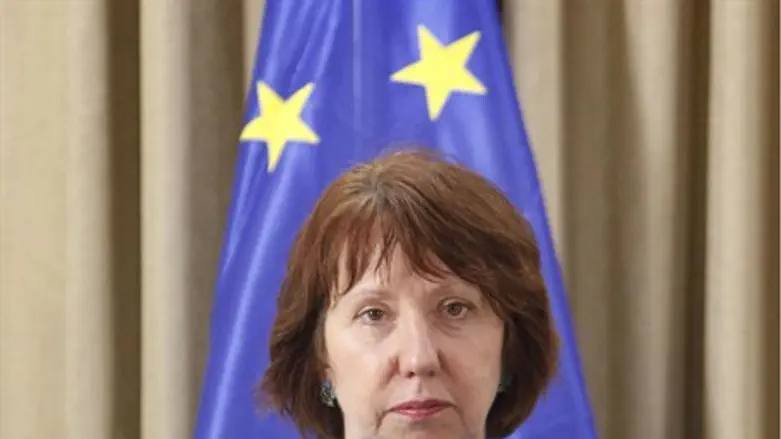
Over 500 academics including researchers from 13 European Union (EU) states, have written to EU Foreign Policy Chief Catherine Ashton, urging her not to cancel or loosen the EU's boycott of Israeli trade and projects in Judea and Samaria.
The EU recently announced guidelines that prevent Israeli universities, companies and projects based in Judea and Samaria, as well as east Jerusalem and the Golan Heights, from receiving EU funding.
In a statement published by Palestinian establishment daily Al-Ayyam on Monday, Palestinian spokeswoman Hanan Ashrawi said the European guidelines were an important element in the Palestinian decision to resume the recent talks with Israel in the first place.
The EU has come under pressure from the US, Israel and from legal experts who say the measures are badly thought out, badly timed and won't have any positive effect.
But anti-Israel activists are urging the EU not to soften its stance, as an ongoing though intermittent dialogue between Israeli and EU representatives seeks to find a way around the impasse between the two parties.
The recent letter comes days ahead of talks between Israel and the EU to discuss the issue which has strained relations between the two parties.
Prime Minister Binyamin Netanyahu reacted to the directives lamenting:
"I have to say, on a sad note, that I think Europe, the European guidelines have actually undermined peace.”
He added that the guidelines which forbid EU loans, grants and prizes going not only to Israeli entities located beyond the Green Line, but also to Israeli entities that have any activity beyond the post-1967 lines, would "harden Palestinian positions" and "stand in the way of reaching a solution which will only be reached by negotiations by the parties, and not by an external dictate."
The directives have also caused a storm because they stand to impact Israel's participation in the Horizon 2020 European Research and Development program, which allows states to pay into the scheme and receive in return research grants. Israel, which has taken part in the major EU R&D project since 1996, had been expected to invest some 600 million euros over the next seven years in the flagship EU research and development program, and get back in inbound grants and investments some 900m.
But now, Israel has warned that it would not only shun the research program in response to the boycotting guidelines, but would also refuse to sign any contracts with Europe so long as its boycott of Judea, Samaria, eastern Jerusalem and the Golan Heights continues.
The recent letter to Ashton makes particular reference to Horizon 2020 urging,"the EU to implement its new guidelines in full and to ensure that projects, companies and institutions located in illegal Israeli settlements are not eligible for EU research funding."
Hundreds of legal experts from Israel and around the world have also written to the EU’s Foreign Affairs Chief and asked her to annul the boycott, noting that the decision does not have a legal basis, because, they argue, Judea and Samaria is not occupied territory in the legal sense of the term.
French Foreign Minister Laurent Fabius added his call for the guidelines to be reviewed, suggesting that they may have created a new legal situation that EU leaders had not meant to create.
“We were told of instances in which the guidelines have changed the status of institutions and enterprises, which is not what was supposed to happen," he said.
"Certainly this is not intended to sabotage the peace process and therefore we need to closely examine if there are things that were not planned and change where change is needed.”